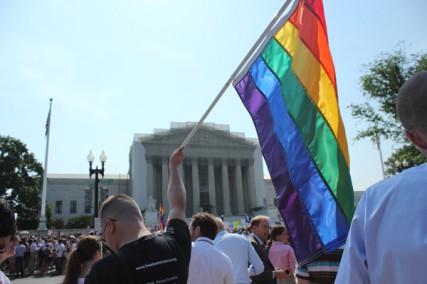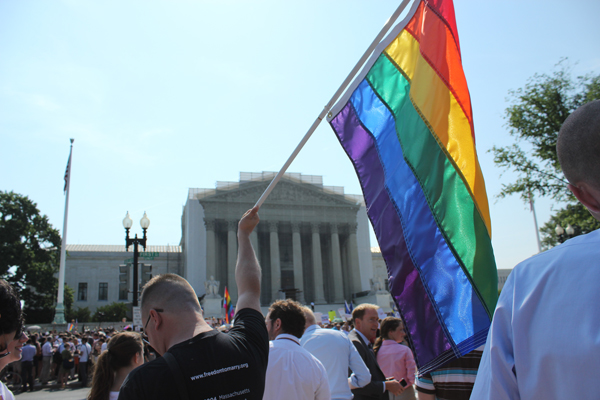(RNS) Gay rights are colliding with religious rights in states like Arizona and Kansas as the national debate over gay marriage morphs into a fight over the dividing line between religious liberty and anti-gay discrimination.

A man holds a gay pride flag in front of the Supreme Court on June 26, 2013 after the court decided to strike down the Defense of Marriage Act. RNS photo by Adelle M. Banks
More broadly, the fight mirrors the national debate on whether the religious rights of business owners also extend to their for-profit companies. Next month, the U.S. Supreme Court will decide whether companies like Hobby Lobby must provide contraceptive services that their owners consider immoral.
The Arizona bill, which is headed to Gov. Jan Brewer’s desk for her signature, would allow people who object to same-sex marriage to use their religious beliefs as a defense in a discrimination lawsuit.
Similar legislation has been introduced in Ohio, Mississippi, Idaho, South Dakota, Tennessee and Oklahoma, according to The Associated Press, while other efforts are stalled in Idaho, Ohio and Kansas.
A bill in Kansas that passed the state House but appears dead in the state Senate was blasted by critics as a “gay segregation” bill, allowing businesses, hotels and restaurants to deny services or accommodations to gays and lesbians based on an employee’s religious convictions.
Proponents cite the case of a New Mexico photographer who was sued after she declined to take photos of a gay commitment ceremony. In asking the U.S. Supreme Court to review her case, photographer Elaine Huguenin said she could take a portrait of a gay couple but not participate in their same-sex ceremony because it would violate her religious beliefs.
In ruling against Huguenin’s case, New Mexico Supreme Court Justice Richard C. Bosson wrote that while Huguenin and her husband are “free to think, to say, to believe, as they wish,” the public accommodation of differing beliefs is “the price of citizenship.”
The Arizona bill would broaden the state’s definition of the exercise of religion to include both the practice and observance of religious beliefs. It would expand those protected under the state’s free-exercise-of-religion law to “any individual, association, partnership, corporation, church, religious assembly or institution or other business organization.”
The law was written by the conservative advocacy group Center for Arizona Policy and Alliance Defending Freedom, a prominent Arizona-based Christian law firm.
At the federal level, gay rights advocates for 20 years have failed to win passage of the Employment Non-Discrimination Act, which would prohibit businesses from discriminating on the basis of sexual orientation.
“This is the next front in gay rights,” said Adam Winkler, a law professor at UCLA. “These laws, by making this issue front and center, will encourage more efforts to pass a federal anti-discrimination law.”
While the Kansas bill explicitly allows businesses and individuals to deny services to gays and lesbians, Arizona’s law is worded more broadly to apply to anything that could violate a person’s religious conscience.
The Kansas bill sparked some infighting within Christian circles. After commentator Kirsten Powers published a column in USA Today arguing that Jesus would bake a cake for a same-sex couple, it set off a chain of objections.
In response to some of the criticism he received for his quotes in the column, Atlanta-area megachurch pastor Andy Stanley tweeted: “Remember the time Jesus told everybody to quit paying taxes imposed by Rome? That was awesome.” And: “Remember that awesome speech Jesus gave about defending religious liberty?” He later deleted the tweets.
The Kansas Catholic Conference released a defense of the bill, written on a model from the Washington-based Ethics and Public Policy Center. But even those debating Christians’ role in the debate were hesitant to defend the wording used in the Kansas law.
“I have no interest in defending the legislation that recently failed in Kansas,” wrote Denny Burk of Boyce College. “I think that good people can disagree on whether that particular law would have been a good idea.”
Arizona already has a state Religious Freedom Restoration Act that protects a person’s free exercise of religion, similar to legislation in about 15 or so other states. The new law is simply strengthening the earlier one, said Charles Haynes, senior scholar at the Freedom Forum First Amendment Center.
“Nondiscrimination is an important American value and a strong value on civil rights. Religious freedom is also highly valued. It’s a core commitment of our country,” he said. “You have two very important claims, and the challenge is to balance these claims, especially when it comes to for-profit businesses.”
Finding a balance between the two will be hard to navigate, said Douglas Laycock, a professor at University of Virginia Law School.
“It’s hard to get the middle that protects the rights of gay individuals to marry and protects the rights of those who don’t want to participate,” he said. “Both gay rights and religious liberty people want rights for their side but not for the other.”
KRE/AMB END BAILEY





